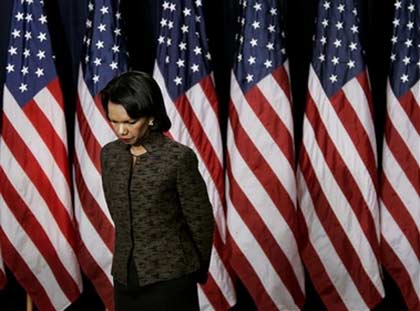Rice: US won't 'pull the plug' on Iraq
(AP)Updated: 2007-01-13 20:54
Shannon, Ireland - Americans' skeptical view of the Iraq war won't change until they see progress there, but the United States won't "pull the plug" on the conflict, Secretary of State Condoleezza Rice said.
Rice would not detail any backup strategy if US President Bush's new plan to turn around the war comes up short, or if the Iraq government fails to hold up its end.
"We're going to get an opportunity to see whether or not this is working, whether or not the Iraqis are living up to their obligations," Rice said Friday.
She decried what she called "the notion ... that, 'Are you just going to pull the plug?'"
"We're not pulling the plug on Iraq," she said.
Most Americans now say they do not support the war or approve of Bush's handling of it.
"What will convince the American people that there's going to be a good outcome here is changes on the ground," Rice said. "No poll is going to change until there is something to show."
The top US diplomat spoke at the start of a Mideast trip designed partly to prod Iraq's neighbors to lend greater help to the struggling government of Iraqi Prime Minister Nouri al-Maliki. The Bush administration is relying on al-Maliki for the success of the plan Bush announced Wednesday to make Baghdad safer from sectarian violence.
Rice is also road testing possible initiatives to nudge Israel and the Palestinians closer to a political accommodation. The United States wants to move more swiftly to shore up Palestinian President Mahmoud Abbas, who is locked in a power struggle with the Islamic militant group Hamas.
"I'm not coming with a proposal, I'm not coming with a plan," Rice said.
On Iraq, Bush's strategy to add 21,500 troops met the stiffest congressional opposition since the war began almost four years ago. Rice came in for some of the toughest questioning Thursday, from Democrats and erstwhile Republican supporters of the war.
At a tense hearing, furious senators referred to sinking public support for a war that has cost nearly $400 billion and taken more than 3,000 US lives.
The reception was more hostile than the administration had expected, but Rice had a ready reply.
"I heard skepticism; I didn't hear alternatives that one can really pursue," she said Friday.
Rice said flagging support for the war at home does not weaken her hand abroad.
Arab allies regularly urge the United States to reinvigorate Israeli-Arab peace efforts as a start toward addressing problems elsewhere, including in Iraq and Iran.
Although Rice seemed eager to switch focus away from Iraq, the Israeli-Palestinian problems may be equally difficult.
While being careful to avoid sounding overly optimistic, Rice said there is a new opportunity for progress and suggested she will reward Abbas for standing firm against Hamas. The Bush administration is asking Congress to approve US$85 million to train and equip Abbas' security forces, and Rice did not rule out a bold stroke to propose rough boundaries of an eventual Palestinian state.
Abbas has repeatedly said he needs to be able to offer Palestinians a vision of a political future that makes the frustrating effort to seek peace seem worthwhile. Abbas has pledged to seek peace with Israel and last month held a much-anticipated meeting with Israeli Prime Minister Ehud Olmert.
US officials are dismayed at the yearlong drift in peace efforts since Hamas won parliamentary elections and took control of much of the Palestinian government. Hamas refuses to renounce violence or recognize Israel, leading the West to cut off vital international aid.
Abbas was elected separately and retains his post, but he has limited power. He has been unable to negotiate a compromise unity government with Hamas, but he has improved his international standing.
The US money for Abbas' security services would be a significant vote of confidence, because those forces have a troubled history of corruption and rights violations under Abbas' predecessor, Yasser Arafat.
|
||
|
||
|
|



